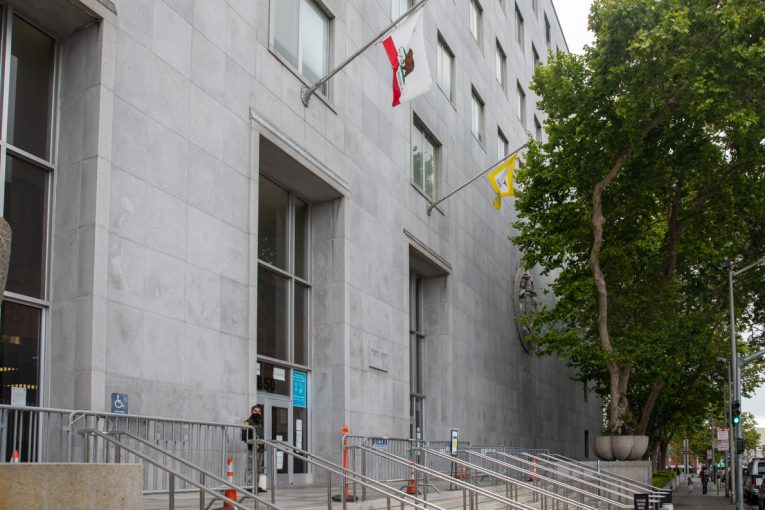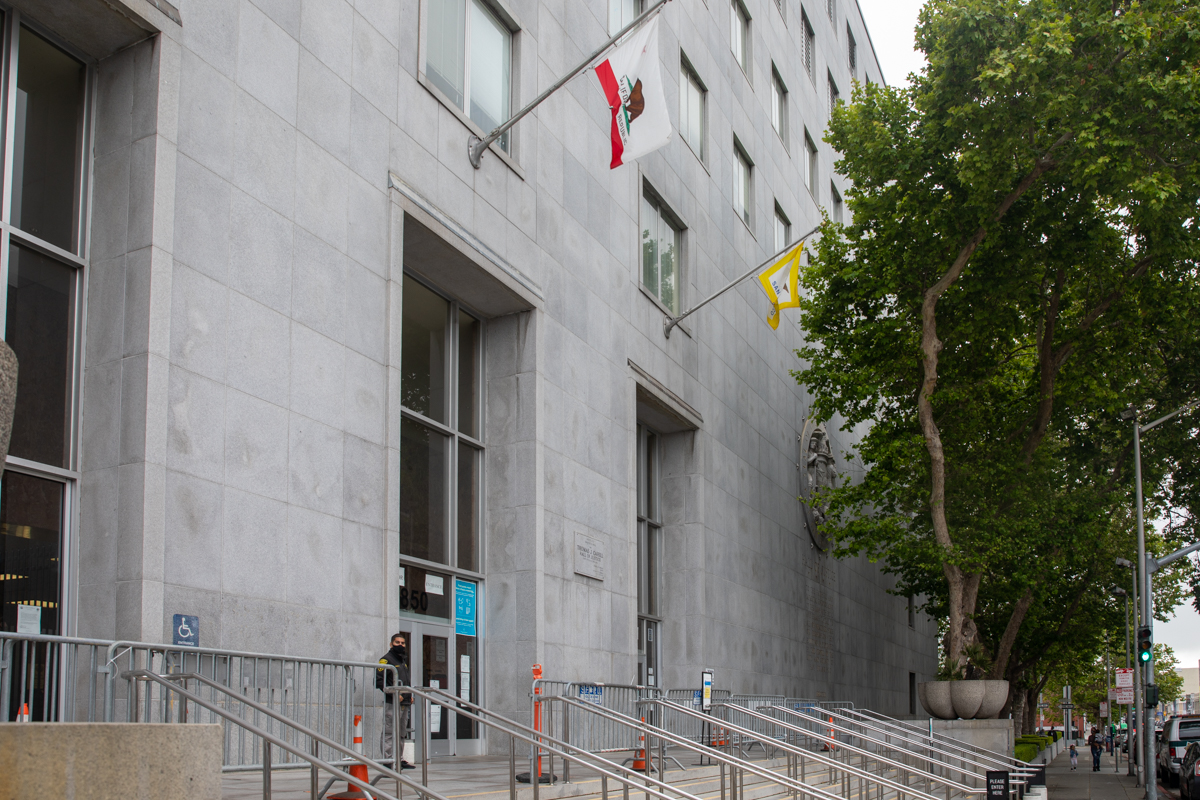

Commentary: Another Sensational Claim Doesn’t Hold Up Under Scrutiny
By David M. Greenwald
Executive Editor
San Francisco, CA -Once again, some members of the media and opponents of SF District Attorney Chesa Boudin have leveled incendiary accusations his way.
Bigad Shaban, who in October chased the DA into a restroom at a public event, laid out a very one-sided account of Thursday’s hearing reporting that the DA’s office is “being accused of withholding evidence in hopes of convicting a San Francisco police officer of excessive force.”
Officer Terrance Stangel is being charged in the vicious  beating of a man who had been accused but never charged with domestic violence.
beating of a man who had been accused but never charged with domestic violence.
His attorney, Nicole Pifari, filed a motion last week to dismiss the charges based on “prosecutorial misconduct” and “deceptive and reprehensible methods” used by the district attorney’s office.
“The DA’s deceit and concealment of real evidence is disturbing, it is corrupt, and it is a violation of public trust,” Pifari wrote. “Most importantly, however, it is illegal.”
A more even-handed account appeared in the San Francisco Chronicle.
A full reading of the proceedings before Judge Teresa Caffese shows this account to be extraordinarily one-sided.
At issue—an arrest warrant for Officer Stangel in which Investigator Hayashi testified she was pressured into omitting exculpatory information. And a photo line-up that apparently wasn’t conducted—even though this was not a “whodunnit” where identification was at issue.
That this has somehow become the latest black mark on DA Boudin is odd, given that much of the decision-making happened prior to when the new DA took office.
The incident occurred on October 6, 2019—prior to DA Boudin being elected and when Suzy Loftus was soon to become acting DA for a few months until Boudin was sworn in on January 8, 2020.
The police department never forwarded the case for domestic violence and Suzy Loftus declined to file charges the police did forward on resisting arrest (PC §148) by the man who was beaten by Officer Stangel, Dacari Spiers.
Hayashi testified that she did not invite Detective O’Connor to an interview with one of the witnesses… on December 3, 2019.
She said, “I didn’t do it because it was the general understanding that I had and was directed that we don’t share our investigative steps.”
Later the judge noted that “she for whatever reason did not tell Sgt O’Connor that she was going to conduct this in-person interview on December 3 (2019)…”
Pifari interrupted, “It wasn’t for whatever reason, it was because she was instructed not to.”
But if she was instructed not to at that time, it would have been pre-Boudin in December 2019, which would undermine the defense’s theory that Boudin’s DA’s office was the one that intentionally derailed the domestic violence investigation.
“The witness today on the stand has admitted that she lied… She admitted that she lied to Sgt. O’Connor about whether or not she did the interview,” Pifari charged.
However, as Assistant DA Moore pointed out, “That interview that somehow is supposed to be this smoking gun of evidence having been suppressed, they’ve had in their possession for such a quantity of time that they used that to cross-examine D.A.I. Hayashi extensively.”
Pifari maintained that the DA’s office failed to file the charges in this case because they wanted to pursue Officer Stangel for excessive force.
“(T)he DA’s office here obstructed the criminal investigation into Spiers and they did so to strengthen their case against (Stangel),” Pifari argued.
The judge however, declared that “whether or not the D.A.’s office decided to charge Mr. Spiers with DV is somewhat irrelevant.” She added “the ultimate question is whether or not there was excessive force used when Mr. Spiers allegedly was not acceding to the commands of the officers.”
Christopher Shea, who has served as an attorney for the SF POA and was acting as attorney for Hayashi, argued, “What I’m getting to is this, my client was forced by the district attorney’s office to minimize the role that Mr. Spiers played in this domestic violence incident.”
But there was also a question as to whether the second interview was in fact exculpatory.
Moore pointed out, “I think the simple basis for the suspicion that exculpatory information was omitted is a second interview that confirms the first interview.”
He added that “all you have is a second identical interview that wasn’t turned over because of some internal disagreement over what flow of information was proffered.” He said, “That doesn’t give rise to Trombetta, it’s certainly not Brady.”
But Hayashi maintained that she was instructed “to remove exculpatory information from the (arrest) warrant.” She testified that ADA Moore instructed her to do so.
However, she could never articulate exactly what information was in fact exculpatory.
“It was an extensive summary from my interview of Ms. Emerson and Lieutenant O’Connor’s interview for Ms. Emerson and Ms. McCreary, the 911 — the two women that reported the DV. It was a summary of their statements,” Hayashi described. “One of the iterations I was told by A.D.A. Moore to remove the section, that it was not relevant to our case, the D.A.’s case.”
While it is true that Hayashi wanted to include more information on the 911 call, the 911 call was turned over by the DA to the defense, as acknowledged during the proceedings, so the charge that they were withholding evidence falls flat.
Hayashi then claimed she was pressured to sign the affidavit.
She testified, “It was a general understanding and my experience in this office if you don’t sign these things, you’ll be fired.”
Here she acknowledges, tacitly at least, that she was not overtly threatened. Though she does indicate “there had been another case I was working on where I was threatened by attorneys three different times that if I didn’t agree with their warrant they would report me to D.A. Boudin and that we were looking at termination possibilities.”
Moreover, there is a real question as to whether there was anything even withheld—let alone it being exculpatory.
The judge noted “there was nothing new that came from the second interview that would have changed the course of the defense.”
She later added, “The point that I’m making here, though, I haven’t heard of any exculpatory information that’s been excluded.”
She added again still later, “But I’m not hearing here that there was any evidence that was suppressed, okay?”
Pifari raised the issue of the photo ID.
“Was ID an issue in this case?” the judge asked.
Hiyashi acknowledged, “No, not that I ever came across.”
The judge responded, “It doesn’t seem like there’s any issue as to who the domestic violence suspect was. He matched the description of the 911 caller; right?”
There was agreement.
The judge later said “the second interview that we’ve really been focusing on with Ms. Emerson that Inspector Hayashi took in December of 2019 was essentially already discovered and in the possession of the defense.” She continued, “2019 was essentially already discovered and in the possession of the defense. I don’t think that with this record there was any suppression of evidence or that the fact that that fact was discovered later affects how the defense is going to proceed and the evidence that I think is relevant in this trial.”
She continued, “So, I don’t think there was any due process violations in terms of the discovery that the defense was given a couple of weeks ago that came through Sergeant O’Connor’s file that would have changed the course of how the case is defended.”
Further, she added, “I don’t think there’s any more or other evidence that—that was exculpatory as to this defendant that would change the course of the defense.”
In the end, the judge, while not dismissing the motion, made her feelings well known that she didn’t see any exculpatory evidence, moreover, nothing was actually suppressed because the DA discovered the second interview anyway.
While Pifari charged that Boudin’s office didn’t file charges against Spier in order to keep the case cleaner for the case against Stangel, the timeline doesn’t seem to bear that out. The charging decisions were made by the police and the DA’s office before Boudin was even in office.
In the end, we have a lot of accusations that are very serious, but no evidence that anything was suppressed—let alone exculpatory.


But Hayashi goes on to say:
Is that overt enough for you?
She wasn’t threatened on this case, they didn’t withhold any evidence, the affidavit for an arrest warrant is based on probable cause, it is not a disclosure document. There no exculpatory evidence. There’s nothing here.
But what does that say about the culture at Boudin’s San Francisco DA’s office? I hadn’t seen that quote yet until your article this morning. What’s your honest feelings about Hayashi’s statement “there had been another case I was working on where I was threatened by attorneys three different times that if I didn’t agree with their warrant they would report me to D.A. Boudin and that we were looking at termination possibilities.”
That’s a very concerning accusation to say the least.
Hard to know, but at most we’ve gone from prosecutorial misconduct and suppressing evidence to at most not having a great culture in the office? If she’s to be believed.
LOL, I can’t believe you said this, why would she lie? If anything this puts her on bad footage with the people she has to work with. Also, you seem to always believe it when accusations are thrown at DA’s with whom you don’t align.
She didn’t come off as very believable. In fact, each claim that was challenged, did not hold up under cross examination by either the prosecutor or the judge.
She claimed that they demanded that she withhold evidence, except it comes out that evidence wasn’t withheld. And the evidence wasn’t exculpatory anyway, it was cumulative and perhaps even redundant.
She claimed that they demanded that she not do a photo lineup, except that it wasn’t an ID case
She claimed that they threatened her if she didn’t, except they didn’t, but then they might have at another occasion that has nothing to do with this. (They didn’t press her on the last point since it was not relevant to the case at hand, but it seems like if they had, it wouldn’t have stood up either).
If that’s what you want to hang your hat on, fine, but it seems pretty thin to me.
That’s your opinion, but you’re somewhat biased when it comes to progressive/reformer DA’s. It’s not like she did this all anonymously, her name is out front and forward. Why would she lie about this, what does she have to gain by lying. I believe her.
Did you believe her when she said she was asked to remove exculpatory evidence? When asked to provide it, what she provided was clearly not exculpatory. So the accuracy of her comments is in question, particularly since this was not cross-examined because it was not relevant to the issue at hand.
”
SF supes pause settlement in police abuse case following misconduct allegations by DA investigator”
It appears that the SF Supervisors are taking DA Investigator Magen Hayashi’s allegations seriously.
Yeah, I think they must have read the media coverage rather than the transcript.
The judge however, declared that “whether or not the D.A.’s office decided to charge Mr. Spiers with DV is somewhat irrelevant.” She added “the ultimate question is whether or not there was excessive force used when Mr. Spiers allegedly was not acceding to the commands of the officers.”
So what does any of this have anything to do with a settlement to Spiers? Answer: nothing. More to come on this.